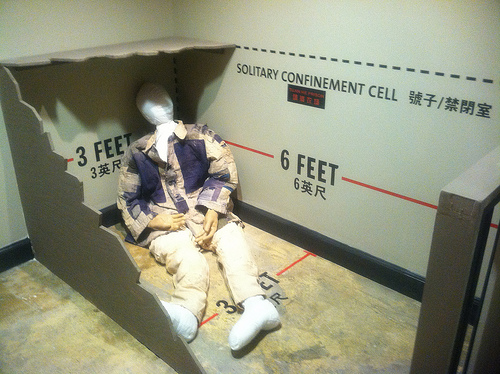by Tienchi Martin-Liao / December 4, 2013
The CCP has abolished its system of forced prison labor, but some believe more legal reforms are necessary.

Model of a Laogai solitary confinement cell, from the Laogai Museum in Washington, DC. Photo: jcm_DC via Flickr.
On November 15, at the Third plenary Session of the 18th CCP Central Committee, the Chinese Communist Party abolished its notorious system of laojiao (reeducation through labor). With its 56 years of history, the laojiao system was a part of the larger Chinese prison mechanism—laogai (Reform Through Labor)—and was originally modeled on the Soviet Union’s Gulag, or forced labor camps.
Above the entrance of Auschwitz one can read the Nazi-German phrase: “Arbeit macht frei” (work makes you free). At the entrance of a Chinese prison, one can read the phrase: “Laodong gei ni xinsheng” (work gives you new life). In the first 30 years of the People’s Republic of China, the criminal justice system had two objectives: Thought reform and forced labor. The communist party wanted to change all “criminals” to “new socialist men and women” and it believed that through physical labor a person’s mind and thoughts could be renewed. That was the situation from the 50s through the 60s and 70s. Then, when Deng Xiaoping dropped Mao’s communist dogma and marched the country forward to materialism, urging the people to “become rich,” his obedient subjects discovered that free prison labor could bring wealth. Consequently, thought reform lost its importance and forced labor became the main objective of the punitive system.
Because of international criticism, the Chinese government abandoned the word laogai in 1990 and began to call its criminal facilities prisons. In 1994 it promulgated the criminal law and the laogai system was officially abandoned. Yet laojiao survived for another 19 years until November 2013. Now it’s finally reached the end and become a historical term.
Lao means labor, jiao means teach—laojiao: “Reeducation through labor.” When this system was in place, as an administrative measure, the police could detain any Chinese citizens who had supposedly committed a minor crime. The detention could last up to four years without a court trial. Theft, prostitution, traffic offenders, fraud, drug use and the like were all subject to this ‘administrative measure.’ Very often it was also used to detain Falungong practitioners or underground Christians, as well as other religious and political dissidents.
Scholars and even government officials have criticized the laojiao system for a long time. Dissident writer and Nobel laureate Liu Xiaobo wrote an article in 2007 entitled “Laojiao, a Draconian Measure that Should Have Been Repealed” in support of legal scholars like He Weifang and Mao Yushi who were fighting to abolish the system. Similarly, a researcher at the high-profile Chinese Academy of Social Sciences, the law specialist Liu Renwen, spent years appealing for the abandonment of laojiao. According to Liu, “Measures like criminal detention and reeducation through labor which deprive personal liberty, must be decided by the court, not by the administrative organ.” Liu even said this when he talked to foreign media in 2012.
